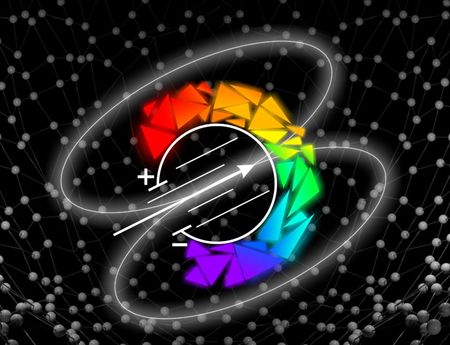
The journal Chemical Communications published a paper by the Multifunctional Luminescent Materials Group working at the JU Faculty of Chemistry. The paper Multifunctionality of luminescent molecular nanomagnets based on lanthanide complexes was written by Dr Robert Jankowski, Maciej Wyczesany and Dr hab. Szymon Chorąży, Prof. UJ.
As stated in the paper’s abstract, ‘Multifunctional materials, which exhibit diverse physical properties, are candidates for the new generation of smart devices that realize many tasks simultaneously. Particular attention is given to single-phase multifunctional materials that offer the new physical effects induced by the coupling between introduced properties. Complexes of lanthanide(3+) ions are an attractive source of multifunctionality since they combine luminescent functionalities related to their f–f or d–f electronic transitions with magnetic anisotropy that originates from spin–orbit coupling and crystal-field effects. The resulting luminescent single-molecule magnets (SMMs) link the area of functional luminophores, applicable in light-emitting diodes or sensing, with the field of molecular magnets, applicable for high-density data storage, and offer additional advantages, e.g., fruitful magneto-optical correlations and the switching of emission by a magnetic field. It was recently shown that luminescent lanthanide SMMs can provide multifunctionality that is richly expanded towards their sensitivity to solvent exchange, temperature, or light, as well as the generation of electrical properties, such as super-ionic conductivity and ferroelectricity, or non-centrosymmetricity- and chirality-related effects, e.g., second-harmonic generation and circularly polarized luminescence. Here, we discuss the pioneering reports on multifunctional materials that use luminescent lanthanide SMMs, with the emphasis of our contribution relying on the functionalization of 4f metal complexes through their insertion into heterometallic d–f coordination compounds’.
The Multifunctional Luminescent Materials Group, established by Dr hab. Szymon Chorąży, Prof. UJ, belongs to the Faculty of Chemistry of Jagiellonian University in Kraków (Poland). Its research interests cover the design, synthesis, and thorough physicochemical characterisation of diversely functionalised luminescent materials mainly based on metal complexes, with particular attention given to coordination assemblies exploring cyanido (CN–) ligands as intermetallic molecular bridges.
The Groups aims at the new generations of luminescent materials that combine light emission phenomena with various physical functionalities and property-generating features, including magnetic effects (magnetic ordering, molecular nanomagnetism), electric properties (switchable dielectric constant, ferroelectricity, ionic conductivity), non-centrosymmetricity and chirality (for non-linear optical properties and chiroptical effects), and sensitivity to physical (temperature, pressure, electric and magnetic fields, light irradiation, etc.) and chemical stimuli (solvents, gases, guest molecules). They are trying to develop unique synthetic strategies for multifunctional luminophores, such as luminescent molecular nanomagnets, emissive molecular ferroelectrics, luminescent proton conductors, chiral luminophores, porous emissive systems, and stimuli-responsive optical and multifunctional opto-electro-magnetic systems. They aim at linking the advantages of luminescent materials, applicable in light-emitting devices, optical communication, photovoltaics, sensors, or bioimaging, with new application horizons originating from the additional physical properties, such as nanomagnetism for high-density data storage devices with the optical output or porosity for highly-sensitive luminescent sensors.





